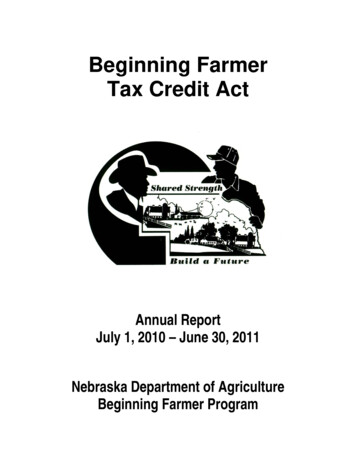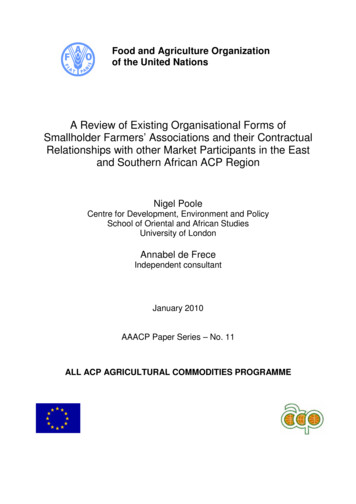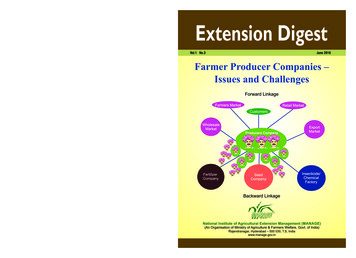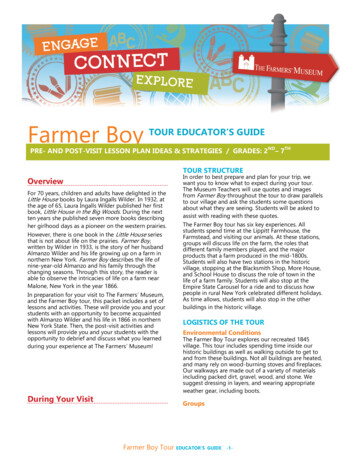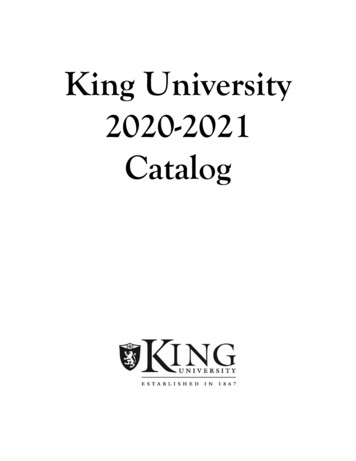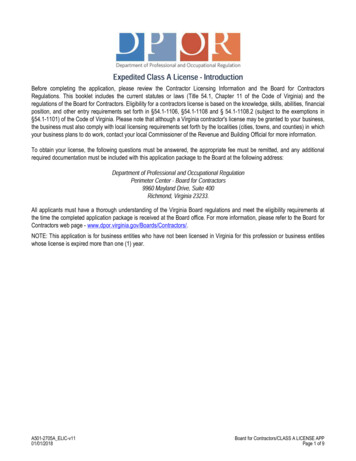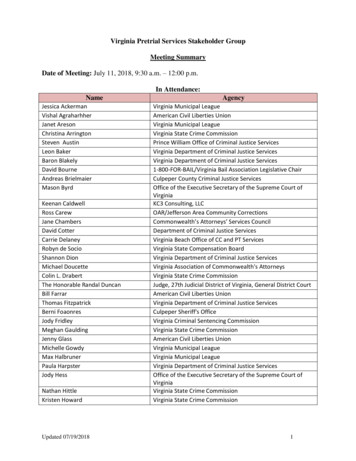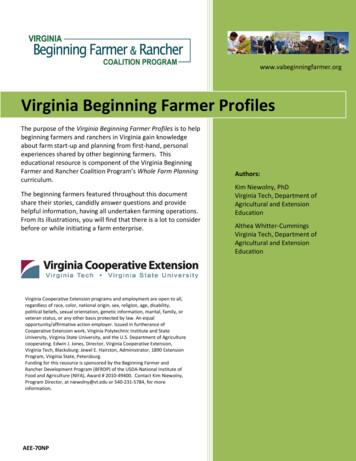
Transcription
www.vabeginningfarmer.orgVirginia Beginning Farmer ProfilesThe purpose of the Virginia Beginning Farmer Profiles is to helpbeginning farmers and ranchers in Virginia gain knowledgeabout farm start-up and planning from first-hand, personalexperiences shared by other beginning farmers. Thiseducational resource is component of the Virginia BeginningFarmer and Rancher Coalition Program’s Whole Farm Planningcurriculum.The beginning farmers featured throughout this documentshare their stories, candidly answer questions and providehelpful information, having all undertaken farming operations.From its illustrations, you will find that there is a lot to considerbefore or while initiating a farm enterprise.Virginia Cooperative Extension programs and employment are open to all,regardless of race, color, national origin, sex, religion, age, disability,political beliefs, sexual orientation, genetic information, marital, family, orveteran status, or any other basis protected by law. An equalopportunity/affirmative action employer. Issued in furtherance ofCooperative Extension work, Virginia Polytechnic Institute and StateUniversity, Virginia State University, and the U.S. Department of Agriculturecooperating. Edwin J. Jones, Director, Virginia Cooperative Extension,Virginia Tech, Blacksburg; Jewel E. Hairston, Administrator, 1890 ExtensionProgram, Virginia State, Petersburg.Funding for this resource is sponsored by the Beginning Farmer andRancher Development Program (BFRDP) of the USDA-National Institute ofFood and Agriculture (NIFA), Award # 2010-49400. Contact Kim Niewolny,Program Director, at niewolny@vt.edu or 540-231-5784, for moreinformation.ForewordAEE-70NPAuthors:Kim Niewolny, PhDVirginia Tech, Department ofAgricultural and ExtensionEducationAlthea Whitter-CummingsVirginia Tech, Department ofAgricultural and ExtensionEducation
The Virginia Beginning Farmer and Rancher Coalition Program is sponsored through the BeginningFarmer and Rancher Development Program (BFRDP) of the USDA-National Institute of Food andAgriculture (NIFA). Award # 2010-49400-21720. www.vabeginningfarmer.orgAcknowledgementsKim NiewolnyVirginia Tech, Department of Agricultural and Extension EducationDirector, Virginia Beginning Farmer and Rancher Coalition Programniewolny@vt.eduAlthea Whitter-CummingsVirginia Tech, Department of Agricultural and Extension EducationResearch Assistant, Virginia Beginning Farmer and Rancher Coalition Programtheawc76@vt.eduTo put the profiles together, we have talked with several individuals in the agriculturecommunity. Recognition belongs to the Virginia beginning farmers and ranchers showcasedhere as well as several Coalitions member organizations. We are most grateful for the time,dedication and contributions. Special acknowledgment goes to: Erik Croushorn, Croushorn FarmsMegan Seibel, Mountain View Farm and VineyardMark Seitz, Huntley Farm & Seitz AngusMarvin Thornton, Thornton Raspberry FarmLouis White, White FarmBette Brand, Farm CreditMaurice Smith Jr., Virginia Cooperative ExtensionDonna Westfall-Rudd, Virginia TechSteering CommitteeThe Virginia Beginning Farmer and Rancher Coalition Steering Committee comprise sevencommitted individuals from the Coalition who represent both farmer and service providerperspectives in Virginia. This elected committee is responsible for guiding program activity tobest address the expressed needs of the Coalition. Alvin Blaha, Laurel FarmDonna Westfall-Rudd, Virginia TechWilliam Crutchfield, Virginia State UniversityKim Niewolny, Virginia TechMegan Seibel, Mountain View Farm and VineyardScott Sink, Hethwood MarketJim Schroering, Virginia Cooperative ExtensionVirginia Beginning Farmer & Rancher Coalition Program Virginia Beginning Farmer Profiles July 26, 2013Page 2
The Virginia Beginning Farmer and Rancher Coalition Program is sponsored through the BeginningFarmer and Rancher Development Program (BFRDP) of the USDA-National Institute of Food andAgriculture (NIFA). Award # 2010-49400-21720. www.vabeginningfarmer.orgManagement TeamThe Virginia Beginning Farmer and Rancher Coalition Program Management Team is housed atVirginia Tech. This team is primarily responsible for the management and evaluation ofprogram activity.Kim Niewolny, Department of Agricultural and Extension Education (Program Director)Donna Westfall-Rudd, Department of Agricultural and Extension EducationRick Rudd, Department of Agricultural and Extension EducationSteve Hodges, Department of Crop and Soil Environmental SciencesKelli Scott, Farm Mentor Coordinator, Southwest VirginiaCJ Isbell, Farm Mentor Coordinator, Central VirginiaJim Hilleary, Farm Mentor Coordinator, Northern Piedmont of VirginiaMatt Benson, Department of Agricultural and Extension EducationAlthea Whitter-Cummings, Department of Agricultural and Extension EducationDebbie Carroll, Department of Agricultural and Extension EducationSpecial thank you to Jennifer Helms, Lisa Hightower, Sarah McKay, and Maurice Smith for theirsupport with the Virginia Beginning Farmer and Rancher Coalition ************************************The Virginia Beginning Farmer and Rancher Coalition Program is a collaborative effortrepresented by a range of beginning farmer stakeholders across the Commonwealth of Virginia.It is housed in Virginia Tech’s Department of Agricultural and Extension Education. Funding issponsored by the Beginning Farmer and Rancher Development Program (BFRDP) of the USDANational Institute of Food and Agriculture (NIFA), Award # 2010-49400. To find more resourcesand programs for beginning farmers and ranchers please visit www.Start2Farm.gov, acomponent of the Beginning Farmer and Rancher Development Program.Contact Kim Niewolny, Program Director, at niewolny@vt.edu or 540-231-5784, for beginningfarmer.orgVirginia Beginning Farmer & Rancher Coalition Program Virginia Beginning Farmer Profiles July 26, 2013Page 3
The Virginia Beginning Farmer and Rancher Coalition Program is sponsored through the BeginningFarmer and Rancher Development Program (BFRDP) of the USDA-National Institute of Food andAgriculture (NIFA). Award # 2010-49400-21720. www.vabeginningfarmer.orgThe Beginning Farmer SituationEmerging trends in U.S. agriculture suggest that in order to enhance our agricultural resourcebase we need to establish, sustain, and preserve our farms, farmers, and farmland. A growingnumber of nongovernmental groups, Cooperative Extension Services, and USDA agencies areworking to improve the viability of new farms, and the economic, social, and environmentalfabric in which they are entrenched (Niewolny & Lillard, 2010). These new initiatives areresponding to an overwhelming concern of a steady decline in the number of individualsentering into agriculture coupled by an increase in the number of exiting farmers and ranchers(Ruhf, 2001).The current population of beginning farmers and ranchers is diverse and varies by locationacross the nation (Ahearn & Newton, 2009). Beginning farmers on average operate smallerfarms—in size and gross dollars—compared to established farmers (Ahearn, Yee, & Korb, 2005).While beginning farmers tend to be younger than established farmers, about a third ofbeginning farmers are at least 55 years or older (Ahearn & Newton, 2009). Beginning farmers,along with limited-resource and socially disadvantaged farmers, make up at least 40 percent ofall U.S. farms (Nickerson & Hand, 2009).The U.S. Bureau of Labor Statistics (2009) recently reported a large job decline for farmers andranchers, and projects an 8 percent decrease in the number of farmers and ranchers between2008 and 2018. The age distribution of today’s farmers and ranchers is also a critical issue.According to the 2007 Census of Agriculture, the average age of a principal farmer is 57 yearsold. More than 63 percent of all established farms in 2007 comprised a principal farmer of 55years of age or older; only 5 percent of all principal farmers were under 35 years or younger(Ahearn & Newton, 2009). This aging population of U.S. farmers and ranchers is expected toincrease by the next census while the number of young farmers is likely to decline.The 2007 Census for Virginia also illustrates a significant need to establish and retain beginningfarmers and ranchers based on the economic structuring of the industry. Agriculture provides 55 billion in income per year and about 357,000 jobs, making it an important industry for theCommonwealth. Of the 47,383 total farms in Virginia, 92 perfect reported less than 100,000in value of sales, while 8 percent of the total farms account for 85 percent of total farm sales.Virginia is also among the most expensive states for farmland, making it difficult for aspiringagriculturists to purchase suitable acreage. The average farm comprises 171 acres, while 77percent of the total farms in Virginia operate on less than 180 acres.Little is known about 13,206 principal farmers in Virginia who have been on their current farmsor ranches nine or fewer years. The majority of all farmers in Virginia are white males, thoughsuch minority farmers as women and African Americans are on the rise. Production crops andpractices differ regionally and culturally, especially between rural and urban centers. Consumerdemand for local and regional food, however, is growing at an increasing rate throughoutVirginia.Virginia Beginning Farmer & Rancher Coalition Program Virginia Beginning Farmer Profiles July 26, 2013Page 4
The Virginia Beginning Farmer and Rancher Coalition Program is sponsored through the BeginningFarmer and Rancher Development Program (BFRDP) of the USDA-National Institute of Food andAgriculture (NIFA). Award # 2010-49400-21720. www.vabeginningfarmer.orgBackground on USDA Beginning Farmer Rancher Development Program (BFRDP)Beginning farmer education for adult and young audiences in the United States can be generallytraced back to the advent of the 1862 and the 1890 Morrill Land Grant Acts. But for the firsttime, the Food, Conservation, and Energy Act of 2008 (The 2008 Farm Bill), appropriated 75million for Fiscal Year 2009 to Fiscal Year 2012 to develop and offer education, training,outreach and mentoring programs to enhance the sustainability of the next generation offarmers.The reasons for the renewed interest in beginning farmer and rancher programs are: the risingaverage age of U.S. farmers; the 8% projected decrease in the number of farmers and ranchersbetween 2008 and 2018; and the growing recognition that new programs are needed toaddress the needs of the next generation of beginning farmers and ranchers. According to theFarm Bill, a beginning farm is considered to be one that is operated by one or more operatorswho have 10 years or less of experience operating a farm or ranch. In 2007, approximately 21percent of family farms met that definition.According the USDA, since its inception, BFRDP has funded many projects to train, educate, andprovide outreach and technical assistance to beginning farmers on one or more of the followingtopics: Production and management strategies to enhance land stewardship by beginning farmersand ranchers. Business management and decision support strategies that enhance the financial viability ofbeginning farmers and ranchers. Marketing strategies that enhance the competitiveness of beginning farmers and ranchers. Legal strategies that assist beginning farmers with farm or land acquisition and transfer. Other Priority Topics to enhance competitiveness and sustainability of beginning farmersand ranchers for the next generation.Virginia Beginning Farmer & Rancher Coalition Program Virginia Beginning Farmer Profiles July 26, 2013Page 5
The Virginia Beginning Farmer and Rancher Coalition Program is sponsored through the BeginningFarmer and Rancher Development Program (BFRDP) of the USDA-National Institute of Food andAgriculture (NIFA). Award # 2010-49400-21720. www.vabeginningfarmer.orgBackground on the Virginia Beginning Farmer and Rancher Coalition ProgramThe Virginia Beginning Farmer and Rancher Coalition Program (VBFRCP) aims to improveopportunities for beginning farmers and ranchers to establish and sustain viable agriculturaloperations in Virginia through the development and enhancement of whole farm planningprograms, online resources, and farmer mentoring networks.Beginning Farmer AudienceThe VBFRCP is aimed at addressing the needs of the spectrum of beginning farmers andranchers in Virginia. We recognize a diversity of farming experiences, backgrounds, and aimsheld by Virginia beginning farmers and ranchers. Many groups find it useful to look at thestages of commitment, decision-making, and skills that farmers pass through as they begin acareer in farming. Drawing upon the work of Sheils & Descartes (2004), the followingcategories are a helpful guide to understanding this pathway: “Prospective” or Explorer farmers individuals interested in starting a farm or ranch. Thisincludes next generation farm family members as well as those who do not come from afarming background. Start-up farmers individuals who are in the early stages of their agricultural operation,often within one to three years of farming or ranching Re-strategizing farmers farmers who are making changes to their operation after farmingfor approximately four to seven years. The individuals usually have increased decisionmaking responsibility and commitment to farming. Establishing farmers those farmers that are expanding , diversifying, and stabilizing withinyears eight to ten of the beginning farmer period. Transitioning farmers individuals who are family farm members who have decisionmaking roles on the farm without having primary farm operator status.Farmer categories are a modification of those referred to by the New England Small FarmInstitute. For full reference, see: Sheils & Descartes (2004). What does the term “new farmer”mean? In Working with new farmers: Topics in professional development (pp. 4-7). GrowingNew Farmers, a special project of The New England Small Farm Institute.Preface written by Kim Niewolny and Matt BensonVirginia Tech, Department of Agriculture and Extension EducationVirginia Beginning Farmer & Rancher Coalition Program Virginia Beginning Farmer Profiles July 26, 2013Page 6
The Virginia Beginning Farmer and Rancher Coalition Program is sponsored through the BeginningFarmer and Rancher Development Program (BFRDP) of the USDA-National Institute of Food andAgriculture (NIFA). Award # 2010-49400-21720. www.vabeginningfarmer.orgTable of ContentsWhy Share Beginning Farmer Stories8Farmer Profiles: Lessons Learned9Louis White10Erik Croushorn13Megan Seibel16Marvin Thornton22Mark Seitz25Preface ReferencesVirginia Beginning Farmer & Rancher Coalition Program Virginia Beginning Farmer Profiles July 26, 201326Page 7
The Virginia Beginning Farmer and Rancher Coalition Program is sponsored through the BeginningFarmer and Rancher Development Program (BFRDP) of the USDA-National Institute of Food andAgriculture (NIFA). Award # 2010-49400-21720. www.vabeginningfarmer.orgWhy share beginning farmer stories?Farming can provide a wide range of opportunities. Beginning farmers and ranchers come fromvaried backgrounds and bring with them a diversity of experiences, goals and interests. It isimportant to consider—and share—share your unique perspectives and experiences as youbegin planning and developing your farm. The beginning farmers and ranchers highlightedhere, share their stories, having all undertaken farming operations. These personal storiescover a range of themes that are relevant to the whole farm planning process. Observe andreflect on their stories as they candidly answer questions and briefly share talking points.The Virginia Beginning Farmer and Rancher Coalition has also developed a series of YouTubevideos which showcase several profile stories, and other beginning farmer footage. Most of theprofile stories have a partnering set of video clips. The videos range from two minutes to fiveminutes and describe challenges and opportunities facing new farmers and ranchers in Virginia.A variety of topics are covered, including gaining access to farmland, capital, and determiningmarketing strategies. These topics and stories are designed to go along with the VirginiaBeginning Farmer and Rancher Coalition Program’s Whole Farm Planning curriculum. Over 20videos are available on the Coalition YouTube channel, and new videos will be posted as theydevelop. The videos and stories here are a useful educational tool for both farmers and serviceproviders. You may visit the Virginia Beginning Farmer and Rancher Coalition YouTube Channelhere: http://www.youtube.com/user/VABeginningFarmersThe following list was used as guided questions for each famer profile. Each profile story hasbeen copy edited for readability from the original audio or video transcript. The videos havealso been edited for production purposes. Therefore, the length and themes will vary fromstory to story. How did you decide to become a farmer and develop a new farm enterprise? How did you decide that it was the right farming option for you? What are the goals for your farm? Describe your farming enterprise; crops, size. What roadblocks if any, did you encounter? What was/are your business plan and or business managing practices? How do you market your products? What external resources have been useful to you? Did you have a mentor or anyone that helped with your business start-up? What can you say about land acquisition? What advice do you have for others who are contemplating a farming enterprise?Virginia Beginning Farmer & Rancher Coalition Program Virginia Beginning Farmer Profiles July 26, 2013Page 8
The Virginia Beginning Farmer and Rancher Coalition Program is sponsored through the BeginningFarmer and Rancher Development Program (BFRDP) of the USDA-National Institute of Food andAgriculture (NIFA). Award # 2010-49400-21720. www.vabeginningfarmer.orgBrief description of the five beginning farmer profiles highlighted in this educational resource:Louis White: Russell CountyLocated in Belfast, Virginia, Louis White operates White Farm; a family owned and operatedlivestock enterprise. Initially, the farm produced livestock as well as tobacco, but in most recentyears, the operation produces beef cattle, mainly Black-Angus. When sold, most of the cattleare shipped directly to feedlots in the west.Erik Croushorn: Prince William, Fauquier, and Culpeper CountiesCroushorn Farms are diversified livestock and vegetable farm enterprises, located in PrinceWilliam, Fauquier and Culpeper counties. Over 470 acres of land account for the production ofbeef cattle, hay, row crops as well as vegetables and eggs. Erik Croushorn manages operationson the more than 100 years old farms.Megan Seibel: Botetourt CountyMountain View Farm and Vineyard, a wine and cattle operation located in Roanoke, Virginia, isfamily owned and operated by Andy and Megan Seibel. 500 acres support the operation, ofwhich 20 acres are planted in grapes, producing 75 tons of fruit across 8 varieties. The very firstvines were planted in March 2000.Marvin Thornton: Sussex CountyMarvin Thornton operates Thornton Raspberry Farm, a peanut and raspberry enterprise on 120acres of land in Wakefield, Virginia. Initially a farmer of cotton and soybeans, Marvin startedproducing peanuts approximately 9 years ago and in most recent years, raspberries. Inside hightunnels Mr. Thornton has about 120 plants and 3 varieties of this ‘super fruit’. When ready forharvesting, these can get up to 6 feet tall.Mark Seitz: Fauquier CountyHuntley Farm & Seitz Angus is a cattle operation located in Fauquier County, Virginia. MarkSeitz is the herdsman for Huntley Farm, and overseas just about 2300 cattle. Additionally, healong with his wife, own and operate Seitz Angus where they produce approximately 200 headsof cattle as well as hay and corn.Virginia Beginning Farmer & Rancher Coalition Program Virginia Beginning Farmer Profiles July 26, 2013Page 9
The Virginia Beginning Farmer and Rancher Coalition Program is sponsored through the BeginningFarmer and Rancher Development Program (BFRDP) of the USDA-National Institute of Food andAgriculture (NIFA). Award # 2010-49400-21720. www.vabeginningfarmer.orgFarmer Profiles: Lessons LearnedLouis White, White FarmBelfast, VAGetting started:I was born into farming. I was raised on a farm, raising livestock andgrowing lots of ‘burley’ tobacco. From when I was a kid it was something that I took an interestin. When I graduated high school, and got ready to go to college, the family had a situation todeal with as it pertained to the future of the farm. My cousin who ran the farm’s operationpassed away, and that experience threw me into making a decision. Do I take charge of theoperation or continue with my education? I chose to stay and take charge of the farm, but Ialso attended community college part time. After earning a certificate in welding, I knew Iwould have something to fall back on just in case the farm’s business was not successful.Farming Perspective and Goals:I see the farm as a business, but the decisions beingmade with the farm also include the family. The farm has been a part of the family for years; mygrandfather had previously run the farm full time. While my father and uncle played activeroles, they both had off-farm jobs. My dad and uncle worked public jobs and my mom and auntwere school teachers. They have always supported me, and I now have the opportunity to farm.Presently, my main goal is concentrating on livestock production. Tobacco has been “playedout” in this and surrounding counties. Comparative to what used to be produced here, there isvery little now; it has not been doing well on the market. The intent for us then has been toexpand our livestock operations, which is beef cattle. I ended up purchasing my uncle’s share ofthe business, so now the onus is on me, and partly my dad. So the business is experiencing atransitional phase. I want to ensure that the beef cattle are the best quality, and that there is anincrease in my head count.Start-up Challenges:I have had a few challenges with getting land to purchase, and inthat regard, my family has been real supportive. Before my granddaddy passed away, there wasland that he left to be divided among three siblings: my dad, my uncle, and my aunt who livesin Knoxville, TN. She still owns land here, but I am able to rent it at a pretty fair price. Shewants to see the farm continue, since she was raised here as a child. Everybody takes itseriously. When my cousin got sick with lung cancer, my dad and uncle wanted to phase out thefarm because they were so heartbroken over his illness. He too had grown up here and was theone to run the farm. I had to step it up. I learned to do everything from baling hay andchopping corn, to taking care of the livestock. The experience taught me a lot. People canalways tell you how to do something, but when get yourself out there, it is different.Finances are another thing I had to deal with. I have gone to the bank to seek financialassistance. But as far as farming goes, in this day and time, there are still a lot of people who donot believe in what you are talking about. It is like a foreign language to them. But on theother hand, I’m dealing with Farm Credit. I can talk with any farm loan officer there and theyVirginia Beginning Farmer & Rancher Coalition Program Virginia Beginning Farmer Profiles July 26, 2013Page 10
The Virginia Beginning Farmer and Rancher Coalition Program is sponsored through the BeginningFarmer and Rancher Development Program (BFRDP) of the USDA-National Institute of Food andAgriculture (NIFA). Award # 2010-49400-21720. www.vabeginningfarmer.orgknow exactly what I am talking about. Where I might go to a financial institution and a cow is acow; it doesn’t matter that there are beef cows, dairy cows, cows and calves. They just don’tunderstand what you are talking about. They can’t help as well as someone who knows thelanguage you’re speaking.Mentors:My father has been a mentor who helped me start the farm business. Since I was akid he would take me out and made me work on the farm. He is now 76 years old; he was 40when I came along. There was a generation gap, but he tried to raise me the way he was raisedon a farm. I liked it and was eager to learn. I would ride with him, and we would be looking atthe cows or calves. I would watch every move he made so I could do the things he did, whetherit was baling hay, chopping corn, plowing or anything else. I was looking out because I wantedto do it. I was preparing to do it on my own.Planning the Farm:I developed the plan for the farm based on equipment and landavailability. I have a lot of farmland leased here in the county, and that just works best for me. Ialso have friends who are business partners. Together, we raise a lot of stocker cattle andpartner to do anything we know will be able to grow the operation and pay the bills. Wherebusiness planning and financial management in developing a plan for the farm are concerned, Idiscuss things with my father and sister. With her educational background, my sister helps a lotin just talking with financial officers and my loan office. They all advise as to what I should andshould not do. They give me direction if I want to do something risky that may hurt thebusiness.Currently Farming:My farm produces beef cattle, mainly Black angus-based cows. Wealso raise preconditioned wiener calves in the spring. We have a fall calving herd bred fromAngus-influenced cows and Charlois bulls. All our buyers seem to like that cross, and most aresold directly to buyers who ship them out west. We also run a Stocker/Backgrounderoperation. We buy Stockers in the fall as well as winter, to graze in the summer. We typicallybuy 500 pounds steer. By the time they leave here they are weighing between 850 and 900pounds. We also background calves that would be turned around in 60 to 90 days aspreconditioned calves. We buy a lot of uncastrated bull calves, as you get these at a reducedcost and that will put more profit in the pocket. There have been challenges in the market,however. It has gotten worse in the last three years. The economy is bad and bankers are reallytight on what they let you do because there are so many risks involved.Start-up Advise:I would advise other new and beginning farmers to fight every day tokeep costs down. It is the costs that eat up everything! Everything goes with a cost: buildingfences, purchasing chemicals for brush control, labor, and so on. We have one full-timeemployee, and I have been blessed to have a couple of retired neighbors who help outtremendously. I also have rental properties and that money goes right back into the farm. It’san extra income that helps with cash flow and keeps things turning. It is difficult to plan for theunexpected when you are just getting paid once or twice a year. For example, two tractorsVirginia Beginning Farmer & Rancher Coalition Program Virginia Beginning Farmer Profiles July 26, 2013Page 11
The Virginia Beginning Farmer and Rancher Coalition Program is sponsored through the BeginningFarmer and Rancher Development Program (BFRDP) of the USDA-National Institute of Food andAgriculture (NIFA). Award # 2010-49400-21720. www.vabeginningfarmer.orgbroke down just a few days ago, and I spent 2,000 on one and 1,800 on the other. This wasnot expected. These things can drain your bank account; you can get yourself in a real bind ifyou are not careful.Some external services can help you with managing your operation. My Cooperative Extensionoffice is really good at getting me assistance; we have always had some good Extension agents.The present agent is very ‘hands-on’. You can pick the phone up, call and talk to him aboutanything. He will always get back to you. He has really assisted the entire county as far asselling calves, or getting together a group of us to make a full load, for which you make moremoney. Our Farm Bureau office, from which we buy all of our insurance, is another very helpfulexternal service. They fight for benefits for the young farmers and all farmers in general.It’s difficult for me to say how I would be able to help new and beginning farmers in Virginia, inregards to what I would like to see. However, I could encourage any person considering farmingto first come up with a plan. Try to get with others in the field, whether it is in a school orcollege. Whatever you are doing, speak with those who will be able to advise in terms of gettingfinancing. In the beginning, things will not necessarily look good on paper. It is important torealize that if you work hard you will overcome a lot, but you also need the right tools to do it.It is much like when I acquired land from my uncle. My goal was to just work towards gettingthe land paid off, and it didn’t work that way. I wanted to keep showing that I was making aprofit, but I had to do fencing of the property, getting additional facilities, and just improve onthings.Most groups of cows we manage are 30-55 head per boundary. So it is just ensuring that thefacilities are right, and that we are better able to manage the cattle. It adds to the value of thelivestock. So facilities, fencing and everything like that plays a role in getting your farm to whereit needs to be. That takes time. That is, unless you are handed something that is perfect. Andin my case, that did not happen. I have to keep running. I have to keep trying to get it in theright direction.Virginia Beginning Farmer & Rancher Coalition Program Virginia Beginning Farmer Profiles July 26, 2013Page 12
The Virginia Beginning Farmer and Rancher Coalition Program is sponsored through the BeginningFarmer an
about farm start-up and planning from first-hand, personal experiences shared by other beginning farmers . This . (NIFA), Award # 2010-49400. Contact Kim Niewolny, Program Director, at niewolny@vt.edu or 540-231-5784, for more . Legal strategies that assist beginning farmers with farm or land acquisition and transfer.
